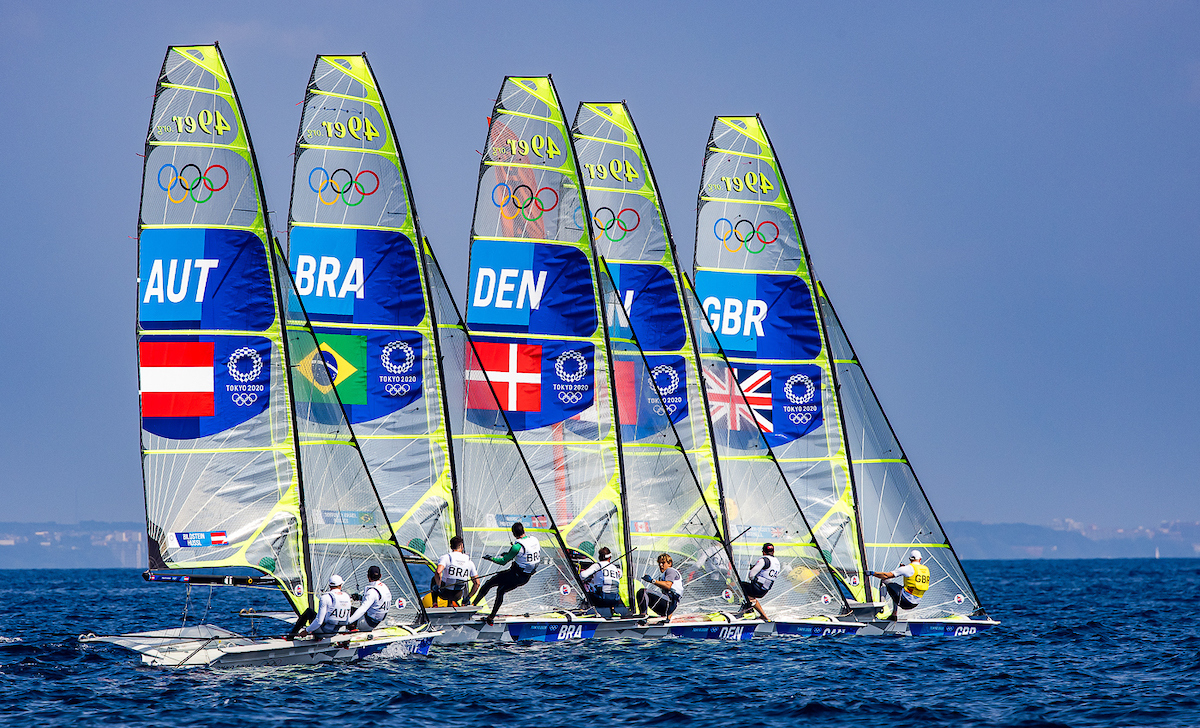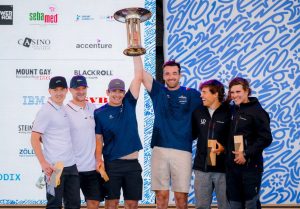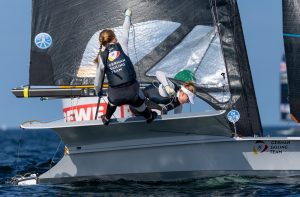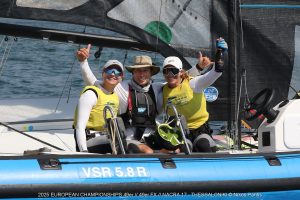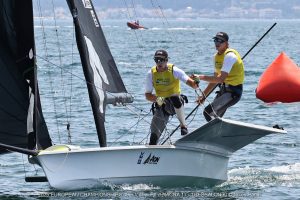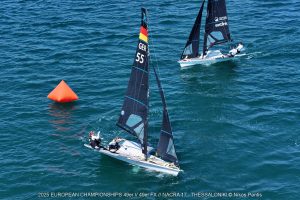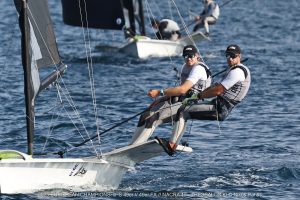The 49er and 49erFX medal races each set the returning Rio Gold medalists against a cadre of worthy challengers. It will not be an easy task for either Peter Burling with Blair Tuke (NZL) nor Martine Grael with Kahena Kunze (BRA) to defend their titles. There will be no simple match races of a single opponent.
In each fleet there are technically six teams who could still take gold, though five real contenders are more likely as the sixth is a stretch in each instance. The test ahead is a pure fleet racing challenge. No doubt the strategies, tactics, and actions will be a constant blend only managed by the very best sailors.
While the minutia of the point differential is crucial, the story here is how each returning champion will perform in a single race for Gold. There are no repeat 49er or 49erFX gold medalists in the history of the class, so either or both of these teams could be writing the record books.
The Racing Is Hard
The final day of fleet racing was a very hard day of sailing. The wind strength was right on the lower limit of what is fair sailing. Further, there were big shifts and changes in pressure, and they were not appearing in any easily discernable pattern. One leg the right would be favored, the next it would be the left – back and forth all day.
In both skiff fleets, top teams were trying all of the strategies, hard right, hard left, up the middle, and each would seem to work sometimes, but not all the time. For the most part, the contenders did pretty well given how challenging it was. However, across both the 49er and FX fleet, the low score on the day was 13 points from 3 races, to each of CRO 49er, and GER and CHN in FX, in contrast to the previous days where teams on a blinder scores 7 or 8 points from three races. It was a very hard day to score low points.
Burling and Tuke – Clutch again… so far
In these, the hardest of conditions, it was Burling and Tuke that scored slightly fewer points of the 49er gold seekers. The Kiwis got 18 points on the day, with GBR and ESP each scoring 22. That 4 point margin is only enough for the Kiwis to be right behind either the Spanish or British in the medal race and still beat them. If there is a boat in between the advantage goes to the medal racer performer.
An example of how Burling and Tuke manage to consistently move to the top in 49er regattas was the first race of the day. They had an OK first part of the beat, not a great start but still held their lane to what seemed like the favored left side. But then the right side came in, meaning all the boats that tacked out were ahead of them, and the Kiwis were relatively deep in the group that went left. They rounded the windward mark near the back of the fleet.
A solid downwind allowed them to pass a couple boats, and then they went hard right on the second beat and the right came in. They moved all the way back up to the front of the pack, a rare and hard thing to do in an elite 49er race. In a race where a mortal team could have scored an 18, Burling and Tuke finished 5th. It’s these types of races that help them win so many championships, a testament to their overall level of skill, aptitude, and attitude in every condition.
However, not everything was going the way of the Kiwis on the final day, and it’s been a much more mixed regatta for them than the past quad. Right at the last moments of the day, they were leading the final race but got pipped at the line by the Irish for the win. At almost the exact same time Fletcher and Bithell (GBR) made a pass on the downwind to move from 7th to 6th. That sort of two point swing was happening all day long, and could be the difference in medals.
FX fleet in flux
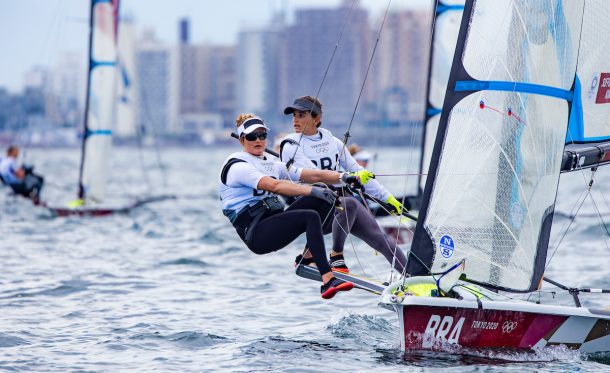
After the two windy days, the FX fleet had four strong contenders leading the way. Now, after two straight days of light winds the whole fleet has moved much closer together. Tied on top are Grael with Kunze (BRA), the defending Rio gold medalists, and Bekkering and Duetz (NED), winners of both the 2018 and 2019 World Championships. Essentially, it is the strongest team from the last quad against the strongest teams from this quad.
Neither team sailed exceptionally, or more specifically, neither team scored exceptionally. Like the 49er racing, the FX racing was incredibly challenging, and while both teams sailed two mid-fleet races and a good one, that isn’t the worst performance. We’re just used to a team or two really dominating.
Of the original four, all are in contention for gold, but Echegoyen with Barcelo (ESP) had a tough day, and have fallen seven points behind the lead. Dobson with Tidey (GBR) faired even worse and have fallen eleven points back. These two teams fell behind teams sailing to mediocre scores… they quite fortunate to have been so far ahead from the first two windy days to still be in contention.
Only one top placed team is in the ascendance. Tina Lutz with Susann Beucke (GER) sailed a 7, 3, 3 and are now only three points back of the Brazilians and Dutch for the lead. Looking back at the regata, the German pair seemed desperately far behind at the halfway point, but their scoreline of 5, 6, 8, 3, 13, 12 on the windy days is not too shabby. It just seemed like they were so far off the pace because of how well the power teams did on those days. Now, with a more balanced regatta overall, the two time European Champions have a great chance to win it all.
49er Math
The medal race will be one of the sternest tests of sailing under pressure in any 49er race ever. 5 champion teams each with every tool in the toolbelt, each with a ton of experience, each with every desire to win – but only 1 can.
The set up – the medal race has 20 points available (22 for a DSQ or OCS), but it’s really 18 (or 20) as even the winner picks up 2 point. In front is NZL, so lets call them 0 points. GBR and ESP are 4 points back. As mentioned above, NZL can finish right behind either boat and still beat them, but a single boat in between and the Kiwis get overtaken. Behind them are GER and DEN, each 14 points back of NZL. So if either of those teams wins, and the Kiwis are 8th or better, then they can move ahead of the Kiwis.
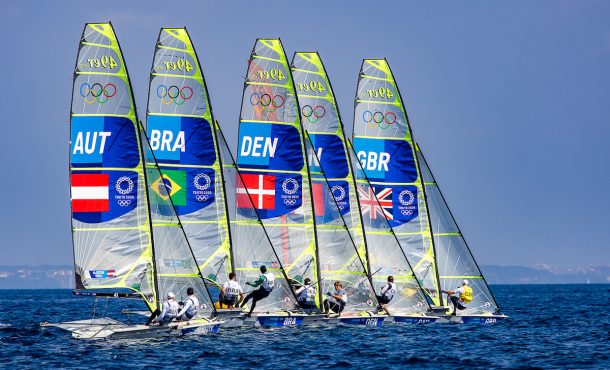
The final team to include in this maths is Portugal. Jorge Lima and Jose Costa are the second most experienced team in the fleet, and they have quietly had an outstanding series. Their only race worse than 11th is an OCS. They’ve won a race, and while they’ve sailed better in the lighter two days, they did fine in the windy days too. They, technically, have a chance at gold but it would take NZL being OCS or DSQ’d, and then them winning the race to make up the 20 point deficit.
FX Math
The set up – the medal race has 20 points available (22 for a DSQ or OCS), but it’s really 18 (or 20) as even the winner picks up 2 point. In front are NED and BRA, so lets call them 0 points. GER is 3 points back. Like in the 49er, the Germans must put one boat between them and the Brazilians and/or Dutch to finish ahead of them. Next is ESP, seven points back. Seven points is not that much in a medal race, but for the Spainish to win gold it does require both Brazil and the Netherlands to finish fifth or worse, and of course, that assumes the Spanish win the race. It’s a similar point calculation for the British, but a bit more tenuous. At 11 points back, both NED and BRA would have to finish sixth or worse, and then the Germans and Spainish would also have to be suitably deep in order for Dobson and Tidey to win gold, but it could happen.
The final team to include in this maths is Argentina. Victoria Travasio and Sol Branz have sails the best second half of the regatta of any team. It’s absolutely tenuous, but they could win gold. For that to happen, all three of NED, BRA, and GER would have to be disqualified, then the Spanish would have to come (new) last in seventh. They would have to win and the British must do no better than fourth… piece of cake;) Closer to reality, they’ll likely just be looking to have another good race, score very few points, and have their fingers crossed that they can move up.
With the fewest points on the final two days was Kimmy Lim with Cecilia Low (SGP). This pair of Optimist world champions have been fully dedicated to FX sailing for more than five years now. Now they get a chance to race in the medal race based on their super skills in the lighter air.
Irish Good-bye
Robert Dickson and Sean Waddilove (IRL) managed to pass Peter Burling and Blair Tuke in the last race of their Olympic games for the win. In some sports, that would make them Gold medalists, but in sailing, that was just the way they concluded their twelve race series, finishing 13th overall, and out of the medal race. Remember if you will, the pair scored a 2 and a 6 on the make-up day of racing but had those results thrown out when a spot check of their harnesses revealed they were 90 grams over the maximum weight. Rules are rules, and the duo accepted responsibility for the mistake, but it bears noting that had they kept those two results the recent Junior World Champions would have shaved 29 points off their score, and would be in the medal race sitting in 8th overall.
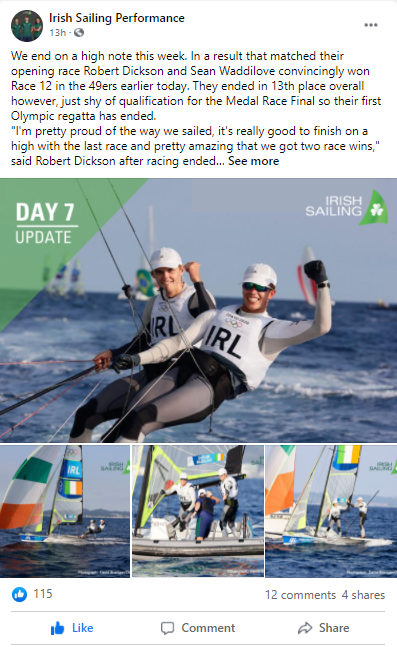
The Olypmics is different
Steph Roble and Maggie Shea (USA) had a more challenging day than watching the tracker indicated. Overnight, the scoreboard was updated to show a DNE in race 11 for the 2020 Bronze medalists. DNE is a disqualification that cannot be dropped, and is a penalty considered the harshest that can be given out, outside of a rule 69 hearing.
The post by US sailing post goes into full detail, so read onward if you wish, but essentially they were given a second rule 42 penalty during a single day of racing, and continued on in the race, earning an automatic DNE.
What’s really happening here is that the Olympics are different. Rule 42 penalties are hardly ever assessed in 49er racing, though in light winds the teams do break the propulsion rules sometimes. It’s just not a particularly significant part of 49er racing, so nobody focusses on it and nobody pays it much attention in between Olympics.
At the Olympics, however, there are a cadre of on water jury boats specially trained to keep the ILCA (Laser/Radial), 470, and Finn fleets in line where rule 42 and propulsion play a major role in their racing. The rule that turns a second rule 42 penalty into an automatic DSQ (or DNE if you don’t retire) is written for fleets where pumping and ooching can make or break your day. When on water judging came in, teams would get caught over and over again pumping, ooching, and rocking, so they added cumulative penalties to combat the on water behavior encountered.
In a skiff, if there is any propulsion done, it is to get a start line position or maybe round a mark… a penalty all the same, but not in any systemic way, as if you get stuck on that many marks you’re not having a great day anyways. The point here is that the rules are written to keep a harsh line on the fleets where systemic propulsion could ruin the game. At an Olympics the same standard is applied to a fleet not used to anyone paying much attention to those rules, nor the penalties. When Roble is quoted saying, “These are the first two yellow flags that we have had in five years of campaigning for the Olympics,” it’s the truth.
In this case, the DNE instead of a DSQ has a significant impact. Those six points move the American’s to 11th instead of in a tie for seventh and a ticket to the medal race.
Welcome all
A quick shout out to Shasha Chen with Ye Jin (CHN) who were low point team on the final day of Tokyo 2020, including the final race win. This is the first time China has participated in the 49erFX fleet, and the did better than the scoreboard indicates. They conclude the regatta in 19th, but that includes 3 X DSQ for the same harness weight infringement of the Irish, though on the day after. Shame there was no boat park buzz to tip them off ahead of the racing, which was in light air too, ensuring a heavy harness was no advantage. They also had very little international experience, exacerbated by a late start to racing in the quad and covid. Still, a 2, 10, 1 day at the Olympics shows they have plenty of potential.
40% of 49er boat sales are now into Asia, with China, Japan, Korea, Singapore, and India being the main destinations. The first ever 49er World Championship in Asia will be in Oman in November 2021, and the Asian fleet is surely on the rise.
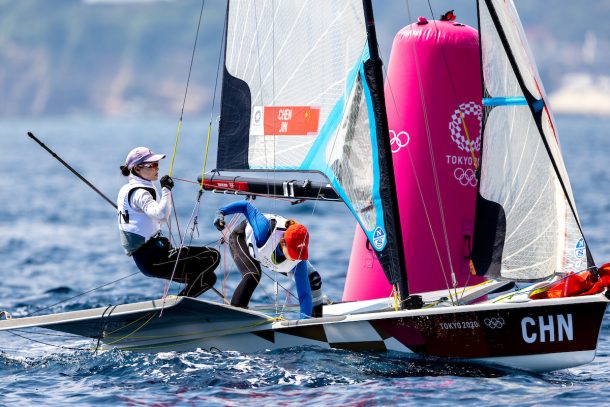
Thanks Japan!
In this post, the Japanese 49er team thanks their supporters, but obviously, it is the sailing community that need be thanking Japan. What great hosts Tokyo has been in this unusual Olympic year. The biggest shame of all is that the world didn’t get to assmble to watch the games in person, but the Japanese hosts still pulled off fantastic hospitality for the athletes.
Being an Athlete Isn’t Always Easy


